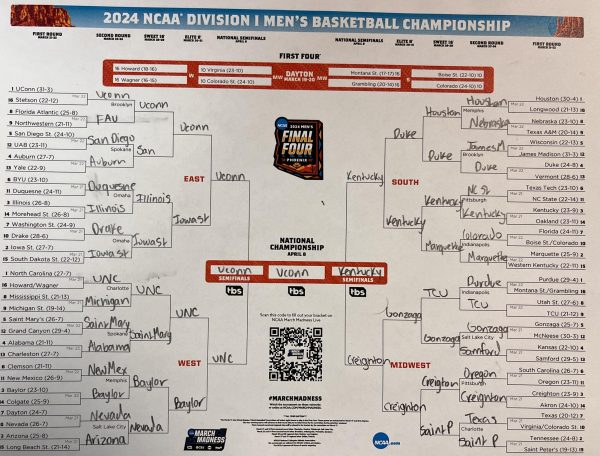Participation Awards Affect on Child Development
*The article is the first in a series to feature senior thesis papers.
Introduction
“If everyone is special, then no one is. If everyone gets a trophy, trophies are meaningless.” – David McCullough. Participation awards have a negative effect on a child’s development due to the altered perspective on the value of hard work and the encouraged lesson that everyone is a winner. The topic of participation awards and trophies has become prevalent on the news and athletes as well as other well-known people have taken a stand on the matter. When discussing such a current topic in news and society, it is important to realize how something seemingly “innocent” can be so detrimental to a child’s development and prevent them from learning and understanding the value of hard work. In order to fully comprehend the discussion of whether or not participation awards have a detrimental effect on a child’s development, you must first be familiar with news speculation over these participation awards, acknowledge the easily influenced minds of adolescents, and appreciate the importance of teaching valuable qualities such as hard work and perseverance to children.
I grew up playing soccer and like any other sport, players were rewarded with trophies or medals for simply participating. This particular topic became prevalent on the news and sparked my interest as this is something I have witnessed throughout my childhood. Growing up as a military kid, faced with many obstacles along the path to maturity, I quickly grasped the importance of working hard and believed that a trophy was worth nothing unless it was earned. This essential lesson originating from the establishment of our country is placed on the backburner in 21st century America, ignored and forgotten about. The United States was built on the principle of hard work, and in the 1930s the idea of The American Dream was created, “the belief that if people take responsibility for their lives and work hard, they will have the individual freedom to pursue their personal goals and compete for success”. While the values of traditional America were that of discipline, dedication, work, efficiency and practicality, 21st century America is very focused on the mental stability of an individual versus the aspect of personal growth that comes with overcoming challenges and potential loss in order to achieve greatness. Much like everything else, starting sports at a young age allows children to develop a passion that could potentially turn into something more. Sports teach teamwork, sharing, leadership, and the value of hard work, allowing children to grow up understanding these valued lessons and skills. However, participation awards, given to players at the end of a game regardless of outcome or skill, have become a section of debate as to whether or not they are affecting a young player’s development.
Literature Review
Participation trophies give children a false reality of success and what it takes to really achieve greatness. According to author Nevin Martell, giving children participation awards at such a young age encourages them to develop the mindset that everyone is a winner, when in fact, there are both winners and losers. Nevin Martell, a well-known author of parenting books, understands the potential lasting effect participation awards have on child development and believes that they in fact have a negative influence on the minds of young children. As described by author Betty Berdan, “when awards are handed out like candy to every child who participates, they diminish in value”. Taking a similar stance as Nevin Martell, Berdan believes that participation awards diminish the value of an award when it’s actually earned and limits the child’s understanding of the importance of working hard to earn rewards and trophies rather than getting them for simply participating. The topic of participation awards continues to stir controversy, bringing to light many different arguments as to the impact, whether that be positive or negative. While similar in the idea that participation awards are harming the mindset of young children, author Ashley Merryman takes a different, yet professional approach to the topic.
Children need to understand that we learn the most through failure and mistakes. Ashley Merryman, author of two well-known and credited books, claims that children constantly receiving an unmerited trophy or reward is teaching children that losing is so terrible that we can never let it happen. This message is very destructive, because “how we react to kids’ failure is just as crucial as celebrating their success”. This topic even sparked an interest with Pittsburgh Steelers Linebacker James Harrison, who posted on Instagram with the comment, “I’m not sorry for believing that everything in life should be earned and I’m not about to raise two boys to be men by making them believe that they are entitled to something just because they tried their best, because sometimes your best isn’t good enough and that should drive you to want to do better”. Harrison received both praise and hate from the public for his comment, but continues to stand by his statement. Participation trophies can symbolize achievement while also embodying the idea that failure isn’t okay. The lesson of failure and what to do after facing trials is what builds character and helps individuals to achieve greatness even amidst times of hardship.
This topic would not be considered a controversy without an opposing viewpoint. In this case, the opposing viewpoint believes that participation trophies remind young kids that they are a part of something special and will help them build enthusiasm to return for another season. Author Lisa Heffernan believes that especially for young children, the goal is for them to improve and help them fall in love with sports. Participation awards help this effort by reminding kids “that we value their effort, regardless of ability or results”. Furthermore, participation trophies tell them that what matters is “showing up for practice, learning the rules of the game and working hard”. Similar to Lisa Heffernan, Dr. Gail Gross believes that participation trophies have a positive effect on child development. As a human behavior, parenting, and education expert, speaker and author, she is very knowledgeable about this topic. She explains that awarding trophies for participation “can be just the positive reinforcement your child needs to foster better self-esteem and security”. In her article, she addresses that only rewarding the winners will result in a lack of desire to show up to practice or participate in the sport as a whole.
This topic is one of many examples of how while addressing the same idea, many authors are able to arrive at different conclusions over whether participation awards have a positive or negative effect on child development. Authors such as Nevin Martell, Betty Berdan, and Ashley Merryman as well as Pittsburg Steelers Linebacker James Harrison, believe that these unmerited awards are having a negative impact on a child’s development and promotes a societal understanding that failure is not acceptable. When children grow up with the mindset that they do not have to work hard to succeed in life, they will not be motivated to achieve greatness. Participation awards discourage players who have dedicated hours of hard work to improve their technique or skill when they receive the same award as another player who just simply showed up. These authors support this argument by saying that participation trophies give children a false reality of success, diminish the value of an award when it’s actually earned, and they prevent children from understanding that we learn the most through failure and mistakes. However, authors Lisa Heffernan and Dr. Gail Gross believe that these awards and trophies are actually beneficial for the child as they promote self-confidence and boost a child’s self-esteem which is necessary for them to want to continue playing the sport. They believe that for children at a young age, it is more important for them to be encouraged and praised for their participation rather than singled out for individual skill or talent.
Methods
This study was intended to determine the proportion of people who believe that participation awards have a detrimental effect on child development. A total of thirty-eight people completed a survey that was posted on various social media platforms as well distributed through a texted link. Participants voluntarily responded to survey questions that clarified their age, sport-related experience, and the qualities of an athlete they believe to be the most important. Next, they were asked if they had ever received a trophy/award and if it was well-earned, how receiving the award made them feel, and whether or not they believe that children are easily influenced. They were also asked to establish their own definition of participation awards, defend their stance, and explain whether they think such awards have a positive or negative effect on child development. Due to the recent controversy over this topic, conducting a survey provided the best opportunity to obtain responses from individuals with different life experiences and opinions on this topic, allowing for an accurate conclusion to be drawn.
Results
The survey contained twenty-four questions as an effort to isolate possible factors that would lead an individual to develop a certain opinion on the topic. Overall, the results greatly supported the claim that participation awards have a detrimental effect to child development, and offered insight on many different perspectives surrounding this issue. While the data was very one-sided in the belief that the awards have a negative impact, the open-ended questions allowed for individuals to elaborate as to why they hold that belief rather than simply stating a clear-cut yes or no answer. The free-response questions, while tedious to analyze, provided much more valuable information than the close-ended, simple response questions.
The survey began with questions regarding age and sports-related experience of the participants. Only twenty-one percent of the individuals who completed the survey were high school students, the remainder of the participants ranging from eighteen to seventy-one years of age. When asked if they have played a sport, ninety-seven percent of the participants responded yes, sixty-two percent having played for more than ten years. Due to the argument that children who do not receive an award for participating become discouraged and result in them quitting that activity, the participants were asked if as a child, they were discouraged if they did not receive an award/trophy. Only twenty-nine percent responded that they in fact were discouraged, however, the eleven individuals who made up the twenty-nine percent, answered unanimously in a following question resulting in a conclusion that the negative feeling they experienced did not make them want to quit participating in that activity.
Included within the survey were various questions which prompted a lengthy, detailed response, in order to completely understand the various perspectives and provide additional evidence to support the claim that participation awards are detrimental to child development. At the heart of the survey, participants were asked to take a stance on the topic and explain why that is what they believe. It was evident that some participants were very passionate about this topic, while others did not have a strong opinion, due to the varying length of the responses and the justifications given. When asked their thoughts on the idea that developing an unhealthy mindset regarding the value of hard work as a child can be harmful to their mental health, one participant responded in agreement stating, “working hard builds strong character and increases their sense of self-worth; people who are not willing or taught to work hard can become entitled and depressed.” Similarly, another participant answered in support of the idea, saying “an attitude of entitlement fosters negative behavior.” While a majority of the responses for that particular question remained one-sided, one individual supported a different perspective, explaining that “if children are pushed too hard at a young age, it could potentially turn them away from something they would have otherwise enjoyed.” Despite many individuals believing that developing an unhealthy mindset as a child can be harmful as they mature, when asked their stance on participation awards, eighteen percent responded stating that participation awards play a beneficial role in encouraging self-improvement and motivating children to continue to participate in that particular activity. The remaining eighty-two percent supported the idea that the awards promote laziness, support a false sense of reality that everyone is a winner, and diminish the hard work and effort of people who are willing to dedicate time and put in the work to improve.
Discussion
This paper sought to determine whether or not participation awards have a detrimental effect on child development. These results suggest that American citizens, regardless of age and life experience, believe that participation awards have a negative impact on children and believe that there are other alternatives for motivating them to participate and receiving an award for simply showing up is doing more harm than good. These findings elaborate on the existing evidence that there is a correlation between the mental development of a child, the way in which they are raised, and the values that are instilled on them. As previously stated by author Betty Berdan and supported by many survey participants, “when awards are handed out like candy to every child who participates, they diminish in value.” Participating in various activities as a child is very important as it teaches many valuable lessons and skills that they will benefit from later in life. A child involved in various activities will have future success having learned the value of comradery, self-discipline, communication, and hard work, but receiving an award for simply showing up eliminates those values. Children at a young age need to be encouraged but that motivational encouragement should be expressed through the praises of their parents regardless of outcome (winning or losing), not just limited to taking home a plastic trophy because how we react to kids’ failure is just as crucial as celebrating their success (Merryman, 2016). Participation awards completely eliminate the competition aspect of sports, teaching young developing minds that life will provide an easy path, when in reality, they will face hardships and obstacles they must overcome to succeed. Without having learned dedication, and understand their self-worth, children will expect everything in life to be handed to them and they will not succeed. They need to understand that life is not like a participation trophy… they actually have to work hard for what they want. Allowing young players to continue this harmful way of thinking will cause them to mature as an entitled individual, under the impression that their value and worth derive from a physical object or a handout (Martell, 2017). Children should be encouraged to play because of their love for the sport, not how receiving an award makes them feel.
Proposing the abandonment and discontinuation of participation awards draws opposition from those who believe these awards remind children that their efforts are valued regardless of achievement or results and that what truly matters is showing up for practice, learning the rules and working hard (Heffernan, 2015). However, based on these conclusions, the American public has a responsibility to raise the next generation with a mindset that will best prepare them for the future. They need to be taught the value and importance of working hard to achieve their goals, and not to rely on physical objects to define their self-worth. With time, the focus has shifted from developing a hard-working, self-sufficient generation, to focusing more on the mental stability of an individual versus the aspect of personal growth that comes with overcoming challenges and potential loss in order to achieve greatness, creating an entitled and unsuccessful generation of individuals.
This paper demonstrates that something seemingly “innocent” can be so detrimental to a child’s development and prevent them from learning and understanding the value of hard work. While many experts agree on the potential negative lasting effects such an award can have on a developing mind, further psychological research is needed to determine exactly how a young child is affected by receiving these awards. However, utilizing both opinions from experts and evidence from conducted research, it is reasonable to conclude that not only are participation awards negatively impacting a young child’s perspective on life, but that there are more beneficial ways to encourage a child to participate, one that does not compromise their character, attitude, or potential to succeed.
Works Cited
Berdan, Betty. “Should Every Young Athlete Get a Trophy?” The New York Times, The New York Times, 6 Oct. 2016, www.nytimes.com/roomfordebate/2016/10/06/should-every-young-athlete-get-a-trophy/participation-trophies-send-a-dangerous-message.
Gross, Dr. Gail. “Why Participation Trophies Are Good For Kids.” Dr. Gail Gross Ph.D., Ed.D., 24 Feb. 2016, drgailgross.com/why-participation-trophies-are-good-for-kids/.
Heffernan, Lisa. “In Defense of Participation Trophies: What They Taught My Son.” TODAY.com, 31 Aug. 2015, www.today.com/parents/defense-participation-trophies-kids-t40931.
Martell, Nevin. “Giving Kids Participation Awards Is Robbing Them of a Vital Lesson.” Washingtonian, 7 Aug. 2017, www.washingtonian.com/2017/08/07/giving-kids-participation-awards-is-robbing-them-of-a-vital-lesson-how-to-lose/.
Merryman, Ashley. “Should Every Young Athlete Get a Trophy?” The New York Times, The New York Times, 6 Oct. 2016, www.nytimes.com/roomfordebate/2016/10/06/should-every-young-athlete-get-a-trophy/forget-trophies-let-kids-know-its-ok-to-lose.









Taylor Hansen • Nov 4, 2020 at 8:41 am
It’s good to know that participation trophies help kids be a part of something special and build enthusiasm. I’m coaching my son’s basketball team this year and I’m wondering if I should get them trophies even if we don’t win the championship. I’ll be sure to find some sort of participation trophies to make them feel better. https://www.wimmeratrophies.com.au/